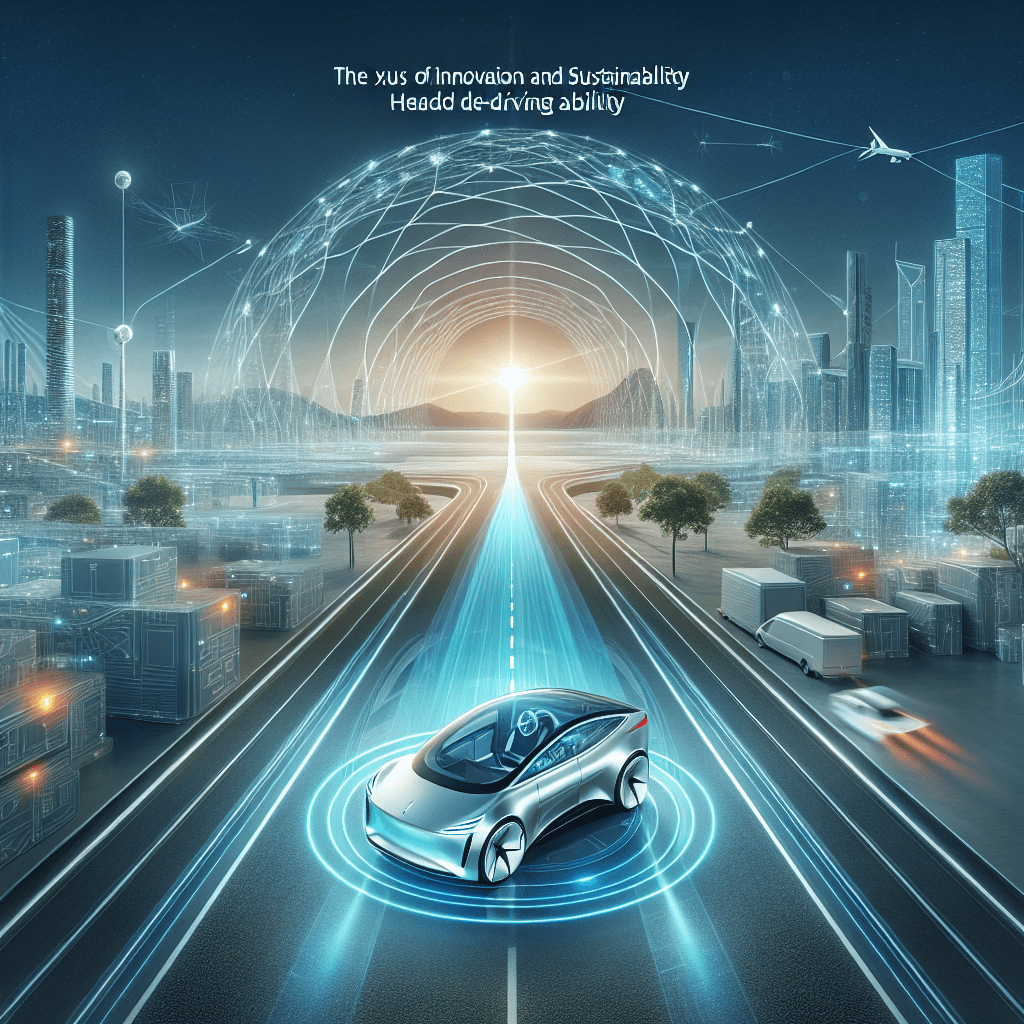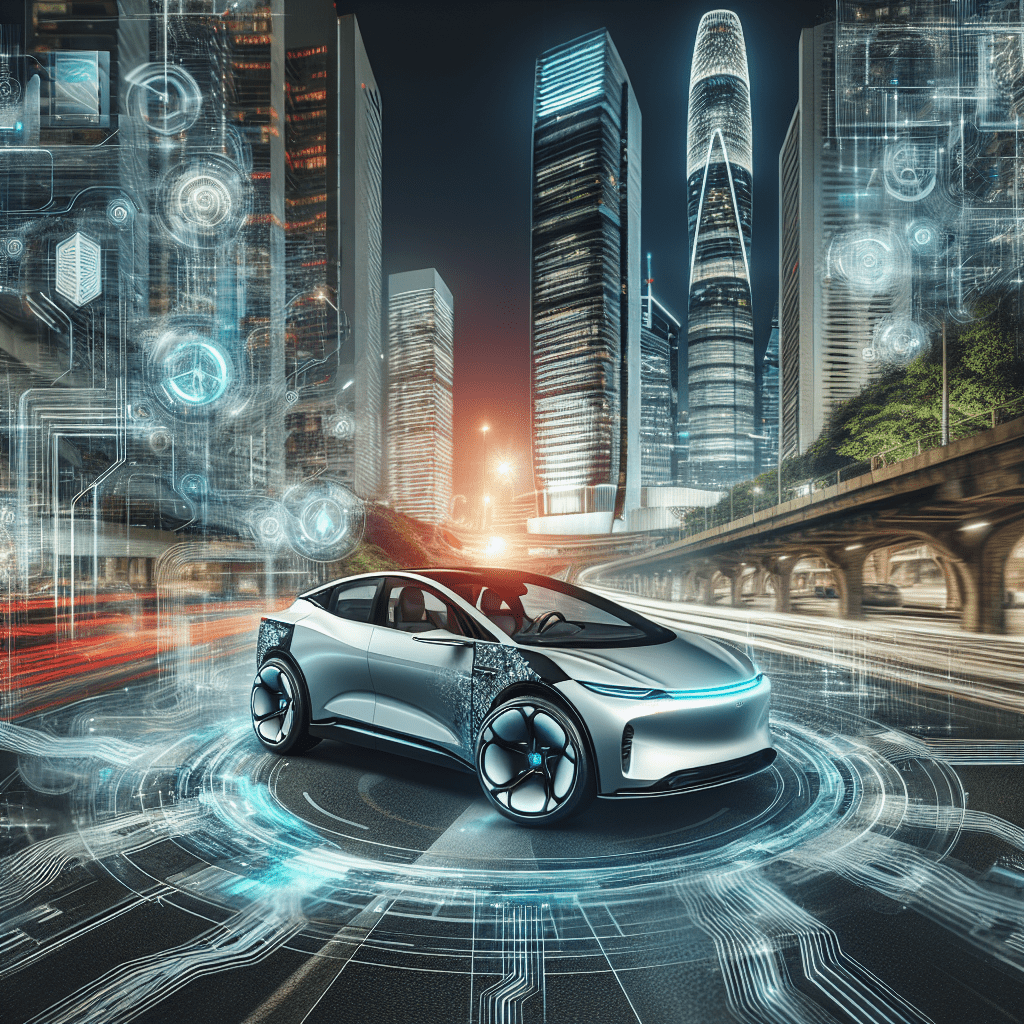Imagine driving on a road where every vehicle around you was completely silent, emitting no pollution, and capable of driving itself. This futuristic vision may not be too far off thanks to Ford’s relentless efforts in developing electric vehicles and autonomous technology. With a commitment to sustainability and a determination to revolutionize the automotive industry, Ford is paving the way for a new era of transportation. In this article, we will explore the innovative advancements made by Ford in electric vehicle technology and the exciting road to autonomy that lies ahead.
Ford’s Electric Vehicle Innovations
Introduction to Ford’s electric vehicle innovations
In recent years, Ford has been making significant strides in the field of electric vehicle (EV) innovations. With a strong commitment to electrification and a focus on autonomous vehicles, Ford is positioning itself as a leader in the automotive industry’s transition to a cleaner and more sustainable future. Through strategic partnerships, investment in technology, and a lineup of groundbreaking EV models, Ford is revolutionizing the way we think about electric vehicles.
Ford’s commitment to electrification
Ford’s commitment to electrification goes beyond simply creating electric vehicles — it is an ambitious strategy to transform the entire automotive industry. With a goal of achieving carbon neutrality by 2050, Ford is investing over $22 billion in EV development and plans to have 40 percent of its global vehicle volume to be electrified by 2030. This commitment is driven by an understanding of the environmental impact of traditional internal combustion engines and a desire to play a pivotal role in reducing carbon emissions. By prioritizing electrification, Ford is leading the charge towards a greener and more sustainable future.
Ford’s approach to autonomous vehicles
As electric vehicles continue to gain traction, so does the demand for autonomous driving technology. Ford recognizes the importance of autonomous vehicles in the future of transportation and has integrated autonomy into its EV lineup. By combining cutting-edge technology and innovative design, Ford is paving the way for a new era of self-driving cars. Through collaborations with tech companies and the development of autonomous driving features, Ford is at the forefront of autonomous vehicle development.
1. Introduction to Ford’s Electric Vehicle Innovations
Overview of Ford’s focus on electric vehicles
Ford’s focus on electric vehicles is a response to the growing concerns about climate change and the need for sustainable transportation solutions. The company understands that EVs offer a cleaner and greener alternative to traditional gasoline-powered vehicles. By investing in electric vehicle technology, Ford aims to provide consumers with environmentally friendly options that do not compromise on performance or reliability.
Importance of electric vehicle innovation in the automotive industry
Electric vehicle innovation is crucial for the future of the automotive industry. As concerns about climate change and depleting fossil fuel reserves continue to mount, the demand for electric vehicles is increasing. The automotive industry is undergoing a significant transformation, and traditional automakers like Ford are adapting to this shift by embracing electric vehicle innovation. By developing new technologies, improving battery efficiency, and expanding charging infrastructure, automakers can meet the demands of the market and contribute to a more sustainable future.

This image is property of pixabay.com.
2. Ford’s Commitment to Electrification
Ford’s strategy for electric vehicle development
Ford’s strategy for electric vehicle development involves investing in research and development, improving battery technology, and expanding its electric vehicle lineup. The company recognizes that innovation is key to success in the electric vehicle market, and it is actively working to stay ahead of the competition. Ford’s strategy is centered around creating electric vehicles that are practical, efficient, and accessible to a wide range of consumers.
Investment in electric vehicle technology
To support its commitment to electrification, Ford has made substantial investments in electric vehicle technology. These investments include the development of advanced battery systems, the improvement of electric powertrain efficiency, and the enhancement of overall vehicle performance. By investing in technology, Ford aims to deliver electric vehicles that are not only environmentally friendly but also technologically advanced and appealing to consumers.
Partnerships for electric vehicle advancements
Recognizing the complexity and magnitude of the electric vehicle industry, Ford has formed strategic partnerships with other companies to advance its electric vehicle initiatives. These partnerships enable Ford to leverage the expertise and resources of other industry leaders, accelerate the development of electric vehicle technologies, and expand its network of charging infrastructure. By collaborating with key players in the electric vehicle ecosystem, Ford can drive innovation and bring its electric vehicles to market more efficiently.
3. Ford’s Approach to Autonomous Vehicles
Integration of autonomy into electric vehicles
Ford believes that the integration of autonomous driving technology into electric vehicles is a natural progression. Not only do autonomous features enhance safety and convenience, but they also complement the efficiency and sustainability of electric vehicles. By combining electric powertrains with autonomous capabilities, Ford is creating a new generation of smart vehicles that can navigate city streets and highways with ease.
Development of autonomous driving technology
Ford’s dedication to autonomous vehicles is evident in its continuous development of autonomous driving technology. The company is investing heavily in research and development to improve the capabilities and reliability of its autonomous systems. Through advanced sensor technologies, machine learning algorithms, and real-world testing, Ford is advancing the state of autonomous driving and bringing us closer to a future where self-driving cars are the norm.
Collaboration with tech companies for autonomous features
Recognizing the complexity of autonomous driving technology, Ford has partnered with leading tech companies to accelerate the development of autonomous features. By collaborating with companies specializing in artificial intelligence, data analytics, and sensor technology, Ford can leverage their expertise and drive innovation in the field of autonomous vehicles. These collaborations enable Ford to incorporate the latest advancements in technology into its autonomous driving systems and stay at the forefront of this rapidly evolving industry.

This image is property of pixabay.com.
4. Ford’s Key Electric Vehicle Innovations
Introduction of Ford Mustang Mach-E
One of Ford’s most significant electric vehicle innovations is the Ford Mustang Mach-E. Introduced in 2020, the Mustang Mach-E is an all-electric SUV that combines the iconic Mustang heritage with the latest electric vehicle technology. With a range of up to 300 miles, fast charging capabilities, and impressive performance, the Mustang Mach-E demonstrates Ford’s commitment to creating electric vehicles that are both practical and thrilling to drive.
The all-electric Ford F-150 Lightning
Another groundbreaking electric vehicle innovation from Ford is the all-electric Ford F-150 Lightning. The F-150 Lightning is an electrified version of the best-selling pickup truck in the United States, offering all the capabilities and ruggedness of its gasoline-powered counterpart but with zero emissions. With impressive towing and payload capacities, advanced technology features, and an estimated range of 300 miles, the F-150 Lightning proves that electric vehicles can be just as capable and versatile as traditional trucks.
Ford’s plans for electric commercial vehicles
Ford is also focusing on the electrification of commercial vehicles, recognizing the significant impact that these vehicles have on carbon emissions. The company has announced plans to introduce electric versions of its popular commercial vehicle lineup, including the Transit van and the E-Transit. By offering electric options for commercial customers, Ford is not only reducing emissions but also providing cost-effective solutions for businesses that rely on transportation.
5. Ford’s Push for Charging Infrastructure
Expansion of charging network
To support the widespread adoption of electric vehicles, Ford is actively working to expand the charging infrastructure. The company is collaborating with charging network providers and utility companies to deploy more charging stations across key locations, such as highways, urban centers, and residential areas. By increasing the accessibility and convenience of charging, Ford aims to alleviate “range anxiety” and make electric vehicle ownership more feasible for consumers.
Investments in fast-charging technology
Recognizing the importance of fast-charging technology, Ford is investing in the development of high-speed charging solutions. Fast-charging allows electric vehicles to recharge quickly, enabling longer trips and reducing downtime. By investing in advanced charging technologies and infrastructure, Ford is removing barriers to electric vehicle adoption and making it easier for consumers to embrace electric vehicles for their everyday transportation needs.

This image is property of pixabay.com.
6. Ford’s Environmental Impact
Reduction of carbon emissions with electric vehicles
The adoption of electric vehicles is a crucial step in reducing carbon emissions and combating climate change. Ford’s electric vehicle innovations are directly contributing to this reduction by providing consumers with clean, zero-emission transportation options. By transitioning from traditional gasoline-powered vehicles to electric vehicles, Ford is playing an active role in reducing greenhouse gas emissions and promoting a more sustainable future.
Sustainable manufacturing practices
Ford is not only focused on creating sustainable vehicles but also on implementing sustainable manufacturing practices. The company is actively working to reduce the environmental impact of its manufacturing processes, including reducing water consumption, minimizing waste, and increasing the use of renewable energy sources. By implementing sustainable practices throughout its manufacturing operations, Ford is ensuring that the entire lifecycle of its electric vehicles is environmentally responsible.
Recycling initiatives for electric vehicle components
To further minimize its environmental impact, Ford is implementing recycling initiatives for electric vehicle components. The company recognizes the importance of responsibly managing the materials used in its vehicles and is actively exploring ways to recycle and reuse materials such as batteries and electronic components. By implementing effective recycling programs, Ford is reducing the environmental footprint of its electric vehicles and ensuring a more sustainable future for the industry.
7. Challenges in Ford’s Electric Vehicle Journey
Battery technology limitations
One of the main challenges in Ford’s electric vehicle journey is the limitations of current battery technology. While battery technology has improved significantly in recent years, there are still constraints in terms of energy density, charging speed, and costs. Ford is investing in research and development to address these limitations and improve the overall performance and efficiency of its electric vehicles. By pushing the boundaries of battery technology, Ford aims to overcome these challenges and deliver even better products to consumers.
Infrastructure gaps for electric vehicles
The availability and accessibility of charging infrastructure remain a challenge for the widespread adoption of electric vehicles. Although the charging network is rapidly expanding, there are still gaps in coverage, particularly in rural areas and certain regions. Ford is working closely with charging network providers, government agencies, and other stakeholders to address these infrastructure gaps and ensure that consumers have convenient and reliable access to charging stations wherever they may be.
Consumer perception and adoption challenges
Despite the growing popularity of electric vehicles, there are still challenges in terms of consumer perception and adoption. Some consumers are hesitant to switch to electric vehicles due to concerns about range anxiety, charging times, and the overall driving experience. Ford is addressing these challenges through education and awareness campaigns, highlighting the benefits of electric vehicles, and showcasing the technological advancements and capabilities of its electric vehicle lineup. By actively engaging with consumers and dispelling misconceptions, Ford is working to increase the adoption of electric vehicles and overcome these perception barriers.

8. Future Outlook for Ford’s Electric Vehicle Innovations
Expansion of electric vehicle lineup
Ford has ambitious plans to expand its electric vehicle lineup in the coming years. By 2030, Ford aims to have 40 percent of its global vehicle volume to be electrified, offering a wide range of electric vehicle options across various segments. This expansion includes electric versions of popular models, as well as the introduction of new electric vehicle platforms. With a strong commitment to electrification, Ford is poised to be a major player in the electric vehicle market for years to come.
Advancements in battery technology
As battery technology continues to evolve, Ford is actively exploring advancements that can further improve the performance and efficiency of its electric vehicles. The company is investing in research and development to develop next-generation battery systems that offer increased energy density, faster charging times, and longer range. By staying at the forefront of battery technology, Ford can deliver electric vehicles that meet and exceed consumer expectations.
Roadmap for autonomous electric vehicles
Ford’s roadmap for the future includes the integration of autonomy and electrification. The company envisions a future where electric vehicles are seamlessly connected and self-driving technology is prevalent. By combining electric powertrains with autonomous driving capabilities, Ford is working towards a future of safer, more efficient, and environmentally friendly transportation. Through continuous innovation and collaboration, Ford is actively shaping the roadmap for autonomous electric vehicles and setting new standards for the industry.
9. Conclusion
In summary, Ford’s electric vehicle innovations are revolutionizing the automotive industry and paving the way for a greener and more sustainable future. With a strong commitment to electrification, a focus on autonomous vehicles, and a lineup of groundbreaking EV models, Ford is at the forefront of the industry’s transition to electric mobility. By investing in technology, expanding charging infrastructure, and addressing challenges, Ford is driving the adoption of electric vehicles and making a significant impact on the future of transportation. With every innovation, Ford brings us closer to a world where electric vehicles are the norm, emissions are reduced, and mobility is more accessible and sustainable for all.



